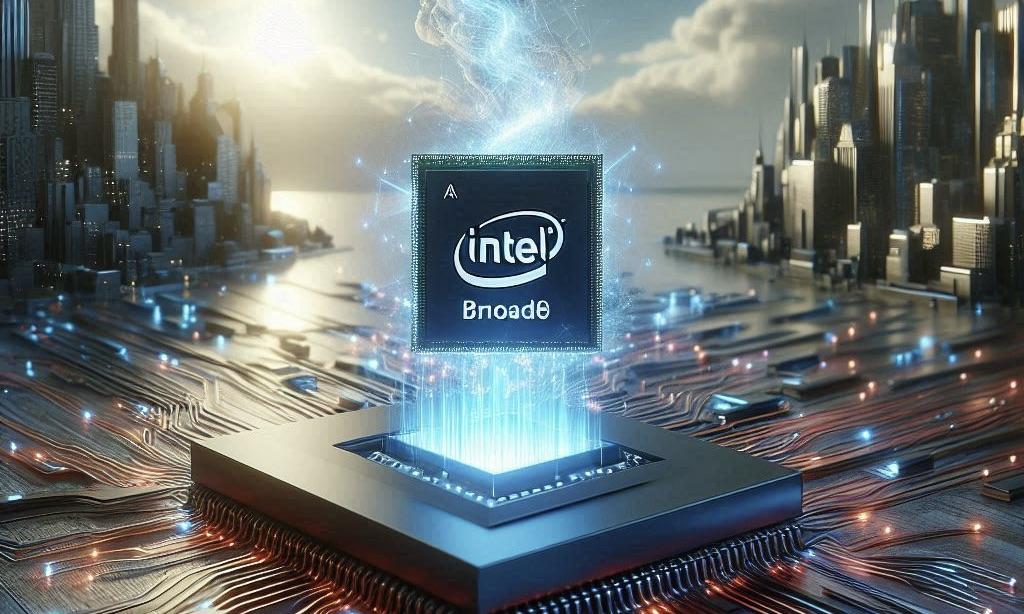Intel’s ambitious 18A semiconductor technology hit a roadblock after Broadcom’s testing revealed concerns about its readiness for high-volume production. While Intel maintains its 18A process is on track for 2025, this setback casts doubt on the company’s ability to compete with rivals like TSMC.
Broadcom's Tests of Intel’s 18A Chip Technology Raise Concerns About Readiness for High-Volume Production
According to sources cited by Reuters, Intel Corporation's contract manufacturing plans have seemingly been impeded by the failure of wafer tests conducted by Broadcom's analysts to produce satisfactory results. These tests examined Intel's cutting-edge semiconductor technology, 18A. Broadloom's tests determined that the process technology needed to be prepared for high-volume production following Intel's shipment of the wafers to its customer just last month.
High-volume production is one of the concluding stages of semiconductor production, which occurs in phases. Chip manufacturers must first fine-tune their equipment before they are comfortable with the risk of producing thousands of wafers.
The firm's contract manufacturing plans are now more in the spotlight following its catastrophic earnings report in August, which saw Intel announce a 15% workforce reduction, a dividend suspension, and meek third-quarter guidance. These plans, a component of Intel's Intel Foundry Services Business, are designed to replicate the semiconductor industry's success of the Taiwanese company TSMC and provide companies like NVIDIA, AMD, and Broadcom with the opportunity to have their processors manufactured by Intel.
Intel employed its state-of-the-art 18A manufacturing technology to print circuits on wafers supplied by Broadcom, as per three sources cited by Reuters, before returning them last month. Nevertheless, after assessing it, Broadcom's engineers needed to be more confident in 18A's capacity to transition to high-volume production.
Intel’s 18A Technology Faces Yield Challenges, But Company Stays Confident in 2025 Production Timeline
High-volume production is one of the final phases in the production process. If success had been achieved, Intel's shares, which had been down 58% year to date, would have received a much-needed boost.
Intel and Broadcom responded to Reuters' inquiries for comments. Broadcom disclosed that it has been conducting tests on Intel Foundry Services' products, which are currently ongoing and have not yielded any definitive conclusions.
Intel emphasized that 18A is still on schedule for high-volume production in 2025. The company stated that Intel 18A is "powered on, healthy, and yielding well," and it is entirely on track to commence high-volume manufacturing next year. However, it declined to provide any additional information regarding specific customer orders.
Reuters sources suggest that the issues may be related to the yield of 18A. The yield of a manufacturing technology is the quantity of functional chips in a wafer, and it is essential to achieve higher yields to establish stable customer partnerships. Yield issues are also prevalent during the initial stages of chip manufacturing technology, which is unsurprising for Intel's 18A, which, in marketing terms, is the most advanced semiconductor fabrication process internationally.
TSMC, the company's Taiwanese competitor, intends to manufacture its 2-nanometer processors by 2025. At a time when AI processors are becoming some of the most highly sought-after products in the world, a successful 18A ramp in 2025 could provide Intel with a critical advantage over its Taiwanese rival. 2-nanometer, or 2nm, stands for 20A.



 Baidu Approves $5 Billion Share Buyback and Plans First-Ever Dividend in 2026
Baidu Approves $5 Billion Share Buyback and Plans First-Ever Dividend in 2026  Nvidia, ByteDance, and the U.S.-China AI Chip Standoff Over H200 Exports
Nvidia, ByteDance, and the U.S.-China AI Chip Standoff Over H200 Exports  Sony Q3 Profit Jumps on Gaming and Image Sensors, Full-Year Outlook Raised
Sony Q3 Profit Jumps on Gaming and Image Sensors, Full-Year Outlook Raised  Nvidia Nears $20 Billion OpenAI Investment as AI Funding Race Intensifies
Nvidia Nears $20 Billion OpenAI Investment as AI Funding Race Intensifies  SoftBank Shares Slide After Arm Earnings Miss Fuels Tech Stock Sell-Off
SoftBank Shares Slide After Arm Earnings Miss Fuels Tech Stock Sell-Off  Missouri Judge Dismisses Lawsuit Challenging Starbucks’ Diversity and Inclusion Policies
Missouri Judge Dismisses Lawsuit Challenging Starbucks’ Diversity and Inclusion Policies  Tencent Shares Slide After WeChat Restricts YuanBao AI Promotional Links
Tencent Shares Slide After WeChat Restricts YuanBao AI Promotional Links  OpenAI Expands Enterprise AI Strategy With Major Hiring Push Ahead of New Business Offering
OpenAI Expands Enterprise AI Strategy With Major Hiring Push Ahead of New Business Offering  FDA Targets Hims & Hers Over $49 Weight-Loss Pill, Raising Legal and Safety Concerns
FDA Targets Hims & Hers Over $49 Weight-Loss Pill, Raising Legal and Safety Concerns  Toyota’s Surprise CEO Change Signals Strategic Shift Amid Global Auto Turmoil
Toyota’s Surprise CEO Change Signals Strategic Shift Amid Global Auto Turmoil  TSMC Eyes 3nm Chip Production in Japan with $17 Billion Kumamoto Investment
TSMC Eyes 3nm Chip Production in Japan with $17 Billion Kumamoto Investment  CK Hutchison Launches Arbitration After Panama Court Revokes Canal Port Licences
CK Hutchison Launches Arbitration After Panama Court Revokes Canal Port Licences  SpaceX Reports $8 Billion Profit as IPO Plans and Starlink Growth Fuel Valuation Buzz
SpaceX Reports $8 Billion Profit as IPO Plans and Starlink Growth Fuel Valuation Buzz  Oracle Plans $45–$50 Billion Funding Push in 2026 to Expand Cloud and AI Infrastructure
Oracle Plans $45–$50 Billion Funding Push in 2026 to Expand Cloud and AI Infrastructure  Alphabet’s Massive AI Spending Surge Signals Confidence in Google’s Growth Engine
Alphabet’s Massive AI Spending Surge Signals Confidence in Google’s Growth Engine  Nasdaq Proposes Fast-Track Rule to Accelerate Index Inclusion for Major New Listings
Nasdaq Proposes Fast-Track Rule to Accelerate Index Inclusion for Major New Listings  Global PC Makers Eye Chinese Memory Chip Suppliers Amid Ongoing Supply Crunch
Global PC Makers Eye Chinese Memory Chip Suppliers Amid Ongoing Supply Crunch 





























